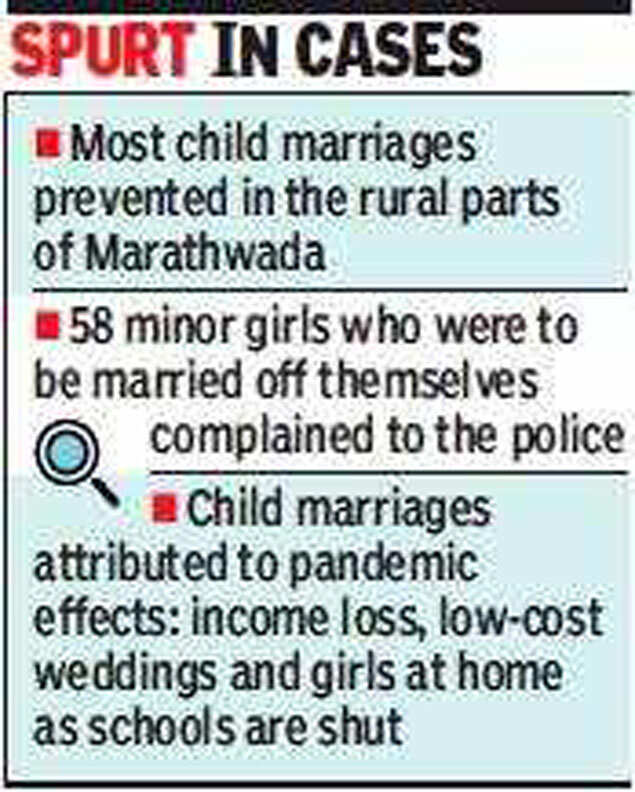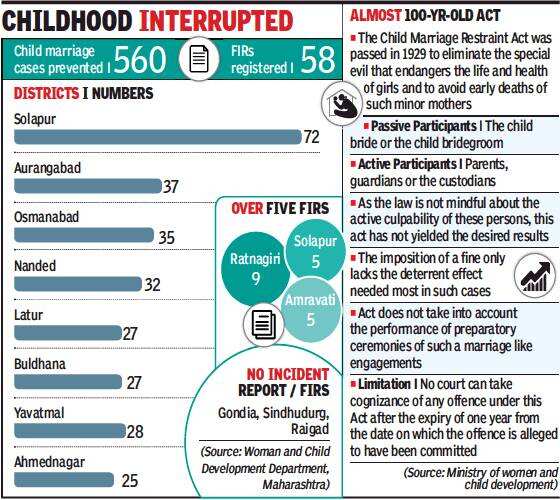560 child marriages foiled in Maharashtra during lockdown

Representative image
PUNE: As many as 560 child marriages have been thwarted by the women and child development department and the state police in drought-prone Solapur, Osmanabad, Latur and some other districts during the lockdown period from March 2020 to April 2021.
While the first information reports (FIRs) were filed by the authorities in most cases, 58 were registered by the affected girls at police stations across the state, Manisha Biraris, programme officer (Child Protection) of the women and child development department, told TOI.

“The department had previously stopped at least 250 child marriages a year. Most were prevented in the rural parts of Marathwada. Child marriages in the drought-prone districts has increased after the lockdown was implemented in March 2020,” Biraris said.
Their teams posted at the district headquarters were tipped off about the child marriages and their members arrived in time to avert them, Biraris said. Some child marriages were reported from semi-urban and urban areas too, she added.

Biraris attributed child marriages to the parents’ loss of income, girls staying at home since schools were closed and the low cost of weddings due to curbs on guest numbers.
Hamid Dabholkar of Maharashtra Andhshraddha Nirmoolan Samiti (MANS), whose organisation prevented five such marriages in the last two months, said they too had observed more child marriages in the lockdown period.
“Many parents are arranging marriages of their minor daughters, but the number of minor boys getting married is negligible. Parents want to marry off their young daughters as quickly as possible because of societal and financial pressures,” he said.
Dabholkar said jobless migrants are returning to their villages from urban areas and such families consider girls a burden. “Secondly, the girls are at home as schools have shut due to the lockdown norms. Parents want to marry off their daughters instead of investing money in their education,” he added.
Anuradha Sahasrabudhe, director of Dnyana Devi Childline, said, “There is no money with many families, no food, and there are no schools. Parents, especially in the rural areas, think they can save money if their daughters are married off early.”
While the first information reports (FIRs) were filed by the authorities in most cases, 58 were registered by the affected girls at police stations across the state, Manisha Biraris, programme officer (Child Protection) of the women and child development department, told TOI.

“The department had previously stopped at least 250 child marriages a year. Most were prevented in the rural parts of Marathwada. Child marriages in the drought-prone districts has increased after the lockdown was implemented in March 2020,” Biraris said.
Their teams posted at the district headquarters were tipped off about the child marriages and their members arrived in time to avert them, Biraris said. Some child marriages were reported from semi-urban and urban areas too, she added.

Biraris attributed child marriages to the parents’ loss of income, girls staying at home since schools were closed and the low cost of weddings due to curbs on guest numbers.
Hamid Dabholkar of Maharashtra Andhshraddha Nirmoolan Samiti (MANS), whose organisation prevented five such marriages in the last two months, said they too had observed more child marriages in the lockdown period.
“Many parents are arranging marriages of their minor daughters, but the number of minor boys getting married is negligible. Parents want to marry off their young daughters as quickly as possible because of societal and financial pressures,” he said.
Dabholkar said jobless migrants are returning to their villages from urban areas and such families consider girls a burden. “Secondly, the girls are at home as schools have shut due to the lockdown norms. Parents want to marry off their daughters instead of investing money in their education,” he added.
Anuradha Sahasrabudhe, director of Dnyana Devi Childline, said, “There is no money with many families, no food, and there are no schools. Parents, especially in the rural areas, think they can save money if their daughters are married off early.”
FacebookTwitterLinkedinEMail
Start a Conversation
end of article
Quick Links
Delhi Air PollutionDelhi TemperatureChennai WeatherBangalore TemperatureCovid vaccination centres in DelhiCoronavirus in DelhiRTPCR test in GurgaonHyderabad RainPollution level in BangaloreDelhi SmogDelhi TemperatureNoida AQIGurgaon AQI todayFire in MumbaiMumbai RainsCovid 19 RT PCR Test in NoidaDelhi AQI todaySrinagar encounter
